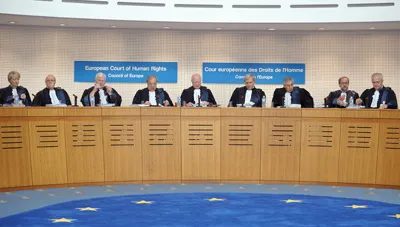The European Court of Human Rights is a victim of its success. In 2011, more than 60,000 people sought its help after exhausting all judicial remedies before national courts. But now, some member states of the Strasbourg-based Council of Europe are pushing for reforms of the prestigious institution and are pointing at the number of cases to make their argument. Instead of enhancing the court’s capacity to deal with the backlog of cases, their moves would clip the court’s prerogatives and undermine a citizen’s capacity to defend his most fundamental rights.
The U.K., which holds the rotating chair of the Council and has expressed irritation in the past at some of the European Court’s judgments, is expected to seek adoption by April of a ministerial declaration on the reform of the Court.
The threat has led dozens of European organizations to mobilize around the European Court and sign a joint statement on “strengthening the protection of human rights in Europe.” They have been joined by international nongovernmental organizations, among them the Committee to Protect Journalists, who are keenly aware of the global significance of the European Court’s jurisprudence. “When Strasbourg speaks, the world’s judges and lawyers listen,” write James A. Goldston, executive director of the Open Society Justice Initiative, and Yonko Grozev of the Bulgarian law firm Grozev & Dobreva.
Journalists also listen. In most of its rulings, the European Court has firmly and consistently supported freedom of expression and freedom of the press. It has also vigorously taken up cases of impunity in attacks against journalists, most famously in the murders of Novaya Gazeta‘s Anna Politkovskaya and of Hrant Dink, the editor-in-chief of the Turkish-Armenian weekly Agos.
But some member states are upset by the European Court’s principled approach and growing authority. Instead of waiting for the implementation of reforms introduced in 2010, which aim to speed up the consideration of cases, the member states seem eager to reduce the “nuisance” of the Court and free themselves from its legally binding judgments. More than 60 percent of the complaints come from Russia, Turkey, Italy, Romania, and Ukraine.
“There is real risk that some of the reforms under consideration will lead to greater delays, restrict the right of individual petition, and provide some governments with greater latitude to avoid their human rights obligations,” write the signatories of the joint statement.
It is true that the member states’ respect of their obligations under the European Convention on Human Rights would be the best way to reduce the number of complaints reaching Strasbourg. But the European Court is also extremely effective at putting pressure on member states to improve their legal system and respect human rights.
Therefore the powers of the European Court should be strengthened, and not diluted or reduced, the signatories of the Joint Statement write. The U.K. should “refrain from further reform of the Convention,” they insist, “and rather focus on three core priorities: enable with additional resources as necessary the Registry and the Committee of Ministers to implement reforms already under way; improve the national execution of Court judgments; and enhance the quality and transparency of the processes for national nomination of judicial candidates to serve on the Court.”
“The European Court of Human Rights provides an invaluable public good, not just for Europeans, but for all people concerned with human rights everywhere,” warn Goldston and Grozev. “In the coming weeks, Europe’s governments will be measured by their commitment to the preservation of this vital global resource.”
